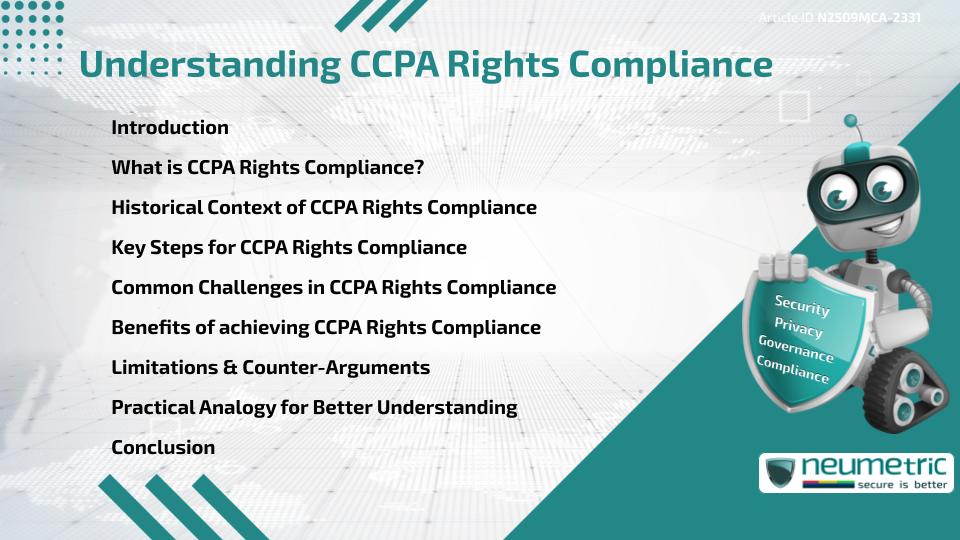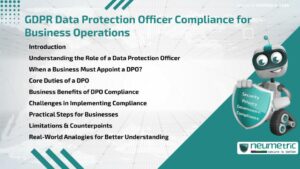Table of Contents
ToggleIntroduction
CCPA Rights Compliance ensures that California residents have greater control over their Personal Information. The California Consumer Privacy Act [CCPA] grants rights such as access, deletion & opting out of data sales. Compliance requires businesses to establish transparent Policies, provide consumer request mechanisms & safeguard Personal Data. This article explores what CCPA Rights Compliance means, its history, the key steps involved, common challenges, benefits & limitations. It also provides practical analogies to make the subject easier to understand.
What is CCPA Rights Compliance?
CCPA Rights Compliance refers to meeting the requirements outlined by the California Consumer Privacy Act, which took effect in 2020. The law grants California residents specific rights regarding their Personal Data, including:
- The right to know what data is collected
- The right to delete Personal Information
- The right to opt out of data sales
- The right to non-discrimination for exercising these rights
Historical Context of CCPA Rights Compliance
The CCPA was passed in 2018 in response to growing concerns about Data Privacy & the practices of large tech companies. It was inspired by the European Union’s General Data Protection Regulation [GDPR] but tailored to California’s unique legal environment. Since its enforcement in 2020, it has become one of the most influential Data Privacy laws in the United States, inspiring other states to adopt similar laws.
Learn more at National Law Review.
Key Steps for CCPA Rights Compliance
To achieve CCPA Rights Compliance, Organisations must take several critical steps:
- Update Privacy Policies: Clearly explain consumer rights & data collection practices.
- Enable consumer requests: Provide tools for consumers to submit data access or deletion requests.
- Implement opt-out mechanisms: A visible “Do Not Sell My Personal Information” link is mandatory.
- Train Employees: Staff should understand compliance responsibilities.
- Secure Personal Data: Protect against unauthorized access & breaches.
- Document compliance efforts: Keep records of Policies, requests & responses.
Common Challenges in CCPA Rights Compliance
Many Organisations face hurdles in compliance, such as managing consumer requests at scale, integrating opt-out systems into websites & aligning with other Privacy regulations. Small Businesses may struggle with the cost of compliance, while larger companies face complexity due to extensive data operations. Inconsistent interpretations of the law can also cause uncertainty.
Benefits of achieving CCPA Rights Compliance
Compliance not only helps businesses avoid fines but also builds consumer trust. By respecting Privacy rights, Organisations strengthen their brand reputation & foster Customer loyalty. Much like providing a warranty reassures buyers, compliance reassures consumers that their data is safe & respected.
Limitations & Counter-Arguments
Critics argue that CCPA Rights Compliance creates excessive burdens, especially for smaller businesses. Others say that the law does not go far enough, since it applies primarily to larger Organisations meeting certain thresholds. While these points raise valid concerns, the broader goal of empowering consumers & improving Privacy practices outweighs the drawbacks.
Practical Analogy for Better Understanding
Think of CCPA Rights Compliance like a restaurant menu. Just as Customers have the right to know what ingredients are in their meal, consumers under CCPA have the right to know what data is collected about them. They can also request certain “ingredients” (data) be removed or choose not to “order” (share) their information at all.
Conclusion
CCPA Rights Compliance is vital for protecting consumer rights in California & ensuring businesses handle Personal Data responsibly. By following key steps like updating Privacy Policies, enabling consumer requests & securing data, Organisations can meet legal requirements & build trust with Customers.
Takeaways
- CCPA Rights Compliance empowers California residents with data rights.
- Compliance requires clear Policies, request mechanisms & opt-out tools.
- Challenges include high costs, complexity & legal ambiguity.
- Benefits include trust, brand reputation & avoiding penalties.
- Despite limitations, compliance is essential for responsible data practices.
FAQ
What does CCPA Rights Compliance mean?
It means meeting the obligations of the California Consumer Privacy Act by providing data access, deletion & opt-out rights to consumers.
Who must comply with CCPA Rights Compliance?
Businesses operating in California that meet thresholds such as $25 million in revenue, handling data of 50,000 or more consumers or deriving over 50% of revenue from data sales.
What rights does the CCPA give to consumers?
The right to know, the right to delete, the right to opt out of sales & the right to non-discrimination.
How do businesses provide opt-out mechanisms?
They must include a clear “Do Not Sell My Personal Information” link on their websites & applications.
What are the penalties for non-compliance with the CCPA?
Fines can reach up to $7,500 per intentional violation and $2,500 per unintentional violation.
Does CCPA Rights Compliance apply only to California residents?
Yes, it applies to California residents, but businesses serving California must comply regardless of their physical location.
How does CCPA differ from GDPR?
CCPA focuses more on consumer rights like opting out of data sales, while GDPR emphasizes consent & broader data processing principles.
Need help for Security, Privacy, Governance & VAPT?
Neumetric provides organisations the necessary help to achieve their Cybersecurity, Compliance, Governance, Privacy, Certifications & Pentesting needs.
Organisations & Businesses, specifically those which provide SaaS & AI Solutions in the Fintech, BFSI & other regulated sectors, usually need a Cybersecurity Partner for meeting & maintaining the ongoing Security & Privacy needs & requirements of their Enterprise Clients & Privacy conscious Customers.
SOC 2, ISO 27001, ISO 42001, NIST, HIPAA, HECVAT, EU GDPR are some of the Frameworks that are served by Fusion – a SaaS, multimodular, multitenant, centralised, automated, Cybersecurity & Compliance Management system.
Neumetric also provides Expert Services for technical security which covers VAPT for Web Applications, APIs, iOS & Android Mobile Apps, Security Testing for AWS & other Cloud Environments & Cloud Infrastructure & other similar scopes.
Reach out to us by Email or filling out the Contact Form…





